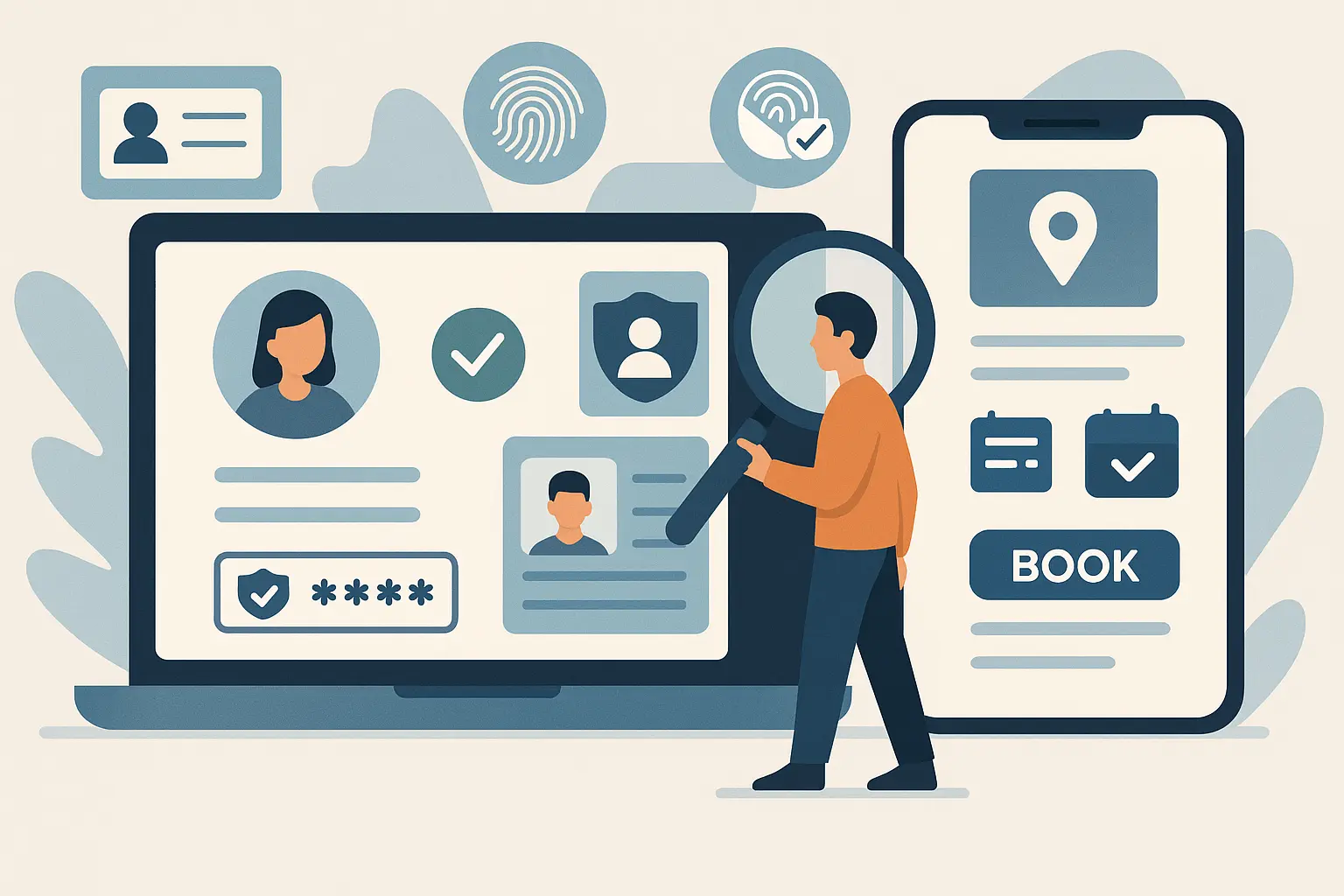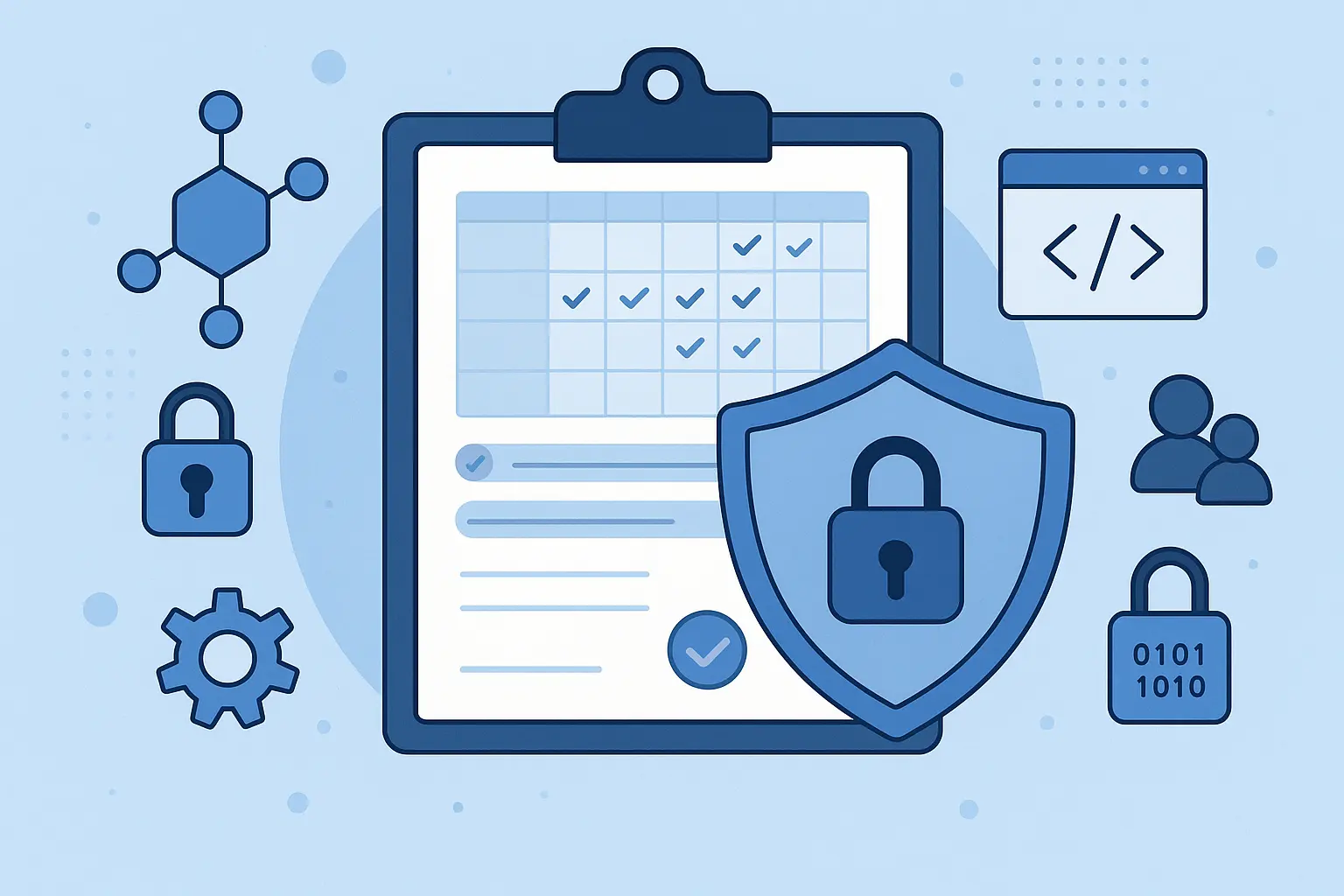Many people have either grown tired of or just don’t like making bookings and reservations via phone calls or emails anymore. Whether it’s for a doctor’s visit, a salon appointment, or a coworking space, they’d rather visit a website and tap a few buttons instead. Online bookings and appointments have thus become an everyday essential. However, the convenience it offers also opens you up to risks like fake users, data breaches, and unauthorized access.
That’s why identity verification plays such a crucial role for booking and appointment platforms. Before users can confirm a reservation or access private details, the system must ensure they’re legitimate. This builds confidence for both the business and the customer, making digital interactions safe, fast, and trustworthy.
What Is Online Identity Verification?
Online identity verification is the process of making sure that a person online is really who they claim to be. It typically involves cross-checking user information, such as official identity documents or biometric data, to confirm its authenticity.
In booking and scheduling systems, online ID verification is the first step towards fighting fraud, deterring fake signups, and preventing identity theft.
A strong verification setup can keep your booking platform secure and ensure a smooth experience for real users.
Why Booking Platforms Need Online ID Verification
Booking and appointment platforms are used across industries, from event ticketing to telehealth consultations. As an increasing number of users share personal and financial data online, these platforms must come up with ways to tackle one common challenge, i.e., combating fraud while maintaining a smooth user experience.
Using appropriate online identity verification methods can help ensure that every booking or appointment is made by a real, verified person. This will protect businesses from fake accounts and bookings and help build long-term trust with users.
For example, an appointment scheduling tool for a doctor’s office or therapy practice might need to confirm each patient’s identity to prevent misuse of the system and comply with critical data protection regulations. Similarly, if a travel website wants to prevent fraudulent transactions and ensure secure payments, it could verify a user’s ID before allowing ticket purchases or hotel reservations as a safety measure.
To put it simply, proper identity verification keeps both the platform and its users safe and accountable.
Key Methods to Verify a Person’s Identity Online
When a customer books an appointment or makes a reservation through your platform, you need a quick, reliable way to confirm they’re real. Below are a few of the most effective verification methods that can help booking systems stay secure without making the process complicated for users.
1. Two-Factor Authentication (2FA) and OTP
Many booking platforms use two-factor authentication (2FA) to make sure users are who they claim to be. This typically means verifying through something the user knows (like a password) and something they have (like a one-time passcode). This OTP may be sent to a verified phone via SMS or email during a critical stage of the booking, such as at registration or checkout. With 2FA, even if a password gets compromised, an attacker would still need that second factor, usually the user’s phone or email. This simple step dramatically reduces unauthorized access.
For instance, let’s say your customer is booking a service or confirming a reservation. To do that, they need to log into your booking platform and prove they are a legitimate user. They will be asked to enter their unique user ID and password. If you have set up SMS 2FA on your site, the user will receive an OTP through SMS on their verified device.
Two-factor authentication adds one more layer of protection while keeping the process easy and familiar.
2. Document Verification
For digital document verification, users are asked to submit some form of official identification, like a passport or driver’s license, to prove their identity. As soon as an ID document is uploaded, the system should automatically scan it and check its authenticity, which is usually done by matching key details like names and photographs.
This online ID verification method is often used for high-value bookings or sensitive appointments, such as property rentals or telehealth sessions.
Modern tools can detect tampering and validate IDs based on official templates. In the context of appointment platforms, this helps prevent fake profiles and ensures that verified professionals and clients are engaging with each other.
3. Biometric Verification
Biometric verification involves identifying users by analyzing their unique physical traits. Common biometric factors include facial features, fingerprints, and even voice patterns.
Many users are already familiar with the concept of unlocking their phones using Face ID or a fingerprint scanner. Booking systems can apply similar technology by asking users to take a quick selfie and matching it to their uploaded ID photo.
Advanced facial recognition systems use liveness detection, a method that confirms a real person is present in real-time (for example, asking them to blink or turn their head) when they are trying to verify their identity. Liveness detection makes it even harder for fraudsters to use photos or videos to spoof an account.
Since biometric data can’t be easily shared or copied, it provides one of the highest levels of security for online verification.
4. Database Verification and Knowledge-Based Checks
Some platforms verify users’ identities by checking their details against trusted databases, such as government or industry-wide registries. Others use knowledge-based authentication (KBA), where users are asked super-personal questions whose answers only they would know.
However, if this personal information is not handled properly, it could end up being exposed and falling into the wrong hands. There have been several incidents of personal data being leaked. Take the Equifax debacle, for instance, where millions of US citizens’ social security numbers, dates of birth, residential addresses, and other highly sensitive details were leaked. Therefore, KBA on its own is usually not enough. You need to combine it with stronger methods, such as 2FA or biometric verification, to maximize fraud prevention.
5. Secure Logins and Social Logins
Secure logins allow users to access booking platforms through pre-established authentication systems whose reliability has already been established. Take corporate single sign-on (SSO) for internal access control, for example. SSO allows employees or members of an organization to use one secure login across multiple tools. This reduces password fatigue and ensures that access to sensitive scheduling data remains controlled and traceable.
Social login, on the other hand, lets a user sign in using an account that already exists on a reliable third-party platform like Google, Apple, or Facebook. This option simplifies sign-ups and logins for customers while still maintaining security, since most social platforms already use two-factor authentication. For booking apps and appointment schedulers, this means faster onboarding and fewer abandoned registrations, without compromising user verification.
6. API-Based Verification
Some booking platforms prefer to customize how verification fits into their workflow. API-based verification enables them to connect with an external identity verification solution that performs ID checks automatically. Through API integrations, a system can verify uploaded IDs, send OTPs, or validate contact information in real time.
This approach saves development time and ensures compliance with privacy regulations while allowing flexibility in user experience design. It also gives booking platform owners more control over the digital identity verification process.
Security, Privacy, and Compliance
Strong identity checks must always go hand in hand with privacy protection. For platforms dealing with sensitive or regulated information, especially in healthcare, therapy, or financial services, this means following strict data security standards like HIPAA and GDPR.
HIPAA-compliant scheduling platforms, for example, must verify user identities while ensuring that protected health information (PHI) remains secure. This includes using encryption, access controls, and audit logs to track who accesses what data. Similarly, GDPR compliance requires minimizing the data collected and ensuring transparency about how it’s used.
In practice, secure booking platforms use HTTPS connections, encrypted databases, and restricted access to sensitive information. They also ensure that verification data (like ID images or biometrics) is processed only for authentication purposes and deleted afterward when possible.
By combining powerful identity verification methods with the adoption of solid privacy practices, booking and appointment platforms can create a safe environment for both customers and service providers.
Conclusion
Online identity verification methods are no longer optional for booking platforms; they’re must-haves. Whether you’re running an appointment scheduling app for healthcare, education, or events, performing ID checks on all users upfront prevents fraud, ensures compliance, and builds user trust.
There is no single answer to your security concerns. The most effective approach is to adopt a multi-layered system, e.g., using both 2FA and document checks. By combining two or more verification methods, booking platforms can create secure, seamless, and trustworthy experiences for everyone involved.






